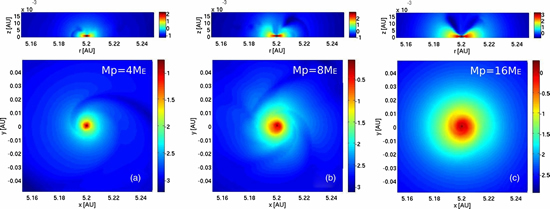Formation of Isothermal Circumplanetary Disks with Three-Dimensional Global Simulations for Sub-Neptune-Mass Protoplanets

In the bottom panels, square sections of surface density simulated with Antares are shown centered at the locations of protoplanets. The surface density is obtained by vertical integration over z < 0.0156 AU (the height of the finest level) for protoplanets with masses of 4, 8, and 16 Earth Masses, respectively. The central star is located on the left and the protoplanets are orbiting the central star counterclockwise. On top of each surface density is the corresponding volume density cutting through the plane defined by
The regular satellites found around Neptune (≈ 17 Earth Masses) and Uranus (≈ 14.5 Earth Masses) suggest that past gaseous circumplanetary disks may have co-existed with solids around sub-Neptune-mass protoplanets (< 17 Earth Masses). These disks have been shown to be cool, optically thin, and quiescent, with low surface densities and low viscosities. Numerical studies of the formation are difficult and technically challenging. As an introductory attempt, three-dimensional global simulations using the Antares code are performed to explore the formation of circumplanetary disks around sub-Neptune-mass protoplanets embedded within an isothermal protoplanetary disk at the inviscid limit of the fluid in the absence of self-gravity. Under such conditions, a sub-Neptune-mass protoplanet can reasonably have a rotationally supported circumplanetary disk. The size of the circumplanetary disk is found to be roughly one-tenth of the corresponding Hill radius, which is consistent with the orbital radii of irregular satellites found for Uranus. The protoplanetary gas accretes onto the circumplanetary disk vertically from high altitude and returns to the protoplanetary disk again near the midplane. This implies an open system in which the circumplanetary disk constantly exchanges angular momentum and material with its surrounding prenatal protoplanetary gas. (Wang, Bu, Shang, & Gu 2014, ApJ, 790, 32)